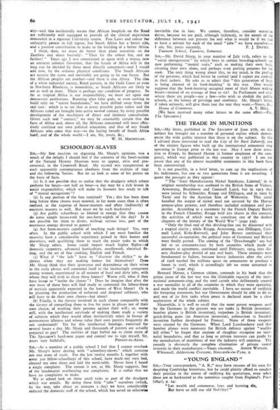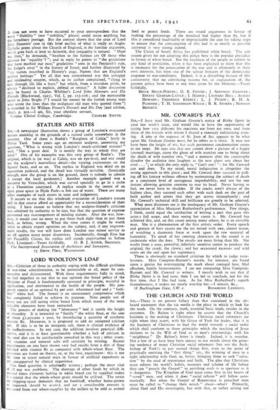"YOUNG ENGLAND "
Sta,—Your correspondent, " A. R.," may have reasons of his own for despising Cambridge historians, but he could plainly afford to emulate their practice to the extent of verifying his quotations, even when these are as hackneyed as the notorious couplet from England's Trust (1840, P. 24:
"Let wealth and commerce, laws and learning die, But leave us still our old Nobility! "
It does not seem to have occurred to your correspondent that the word "Nobility " (not " nobilitie," please) could mean anything but the hereditary peerage. But the context shows that the crux of Lord John Manners' case in this brief section of what is really an Anglo- catholic poem about the Church of England, is the familiar argument, which goes back at least to Aristotle, that inequality is natural. "Must we, then," he demands, " hearken to the furious cry Of those who clamour for ' equality '? "; and in reply he points to " the gradations that have marked our race," gradations " seen in the Patriarch's rule, the Judge's sway " in the history of Israel, and further illustrated by "the names inscribed in History's page, Names that are England's noblest heritage." Yet all that was remembered was this unhappy and misleading couplet, which, as its author complained, "clung to him through life like a burr," but which, from a mistaken pride, he always "declined to explain, defend or retract." A fuller discussion may be found in Charles Whibley's Lord john Manners and His Friends (Blackwood, 1925), Vol. I, pp. 113-116 ; and the memorable retort to John Bright (" I would far sooner be the foolish young man who wrote the lines than the malignant old man who quoted them") is recorded in Sir William Fraser's Disraeli and His Day (and edition, 1891), p. 202.-1 am, Sir, your obedient servant,
Corpus Christi College, Cambridge. CHARLES SMYTH.


























 Previous page
Previous page